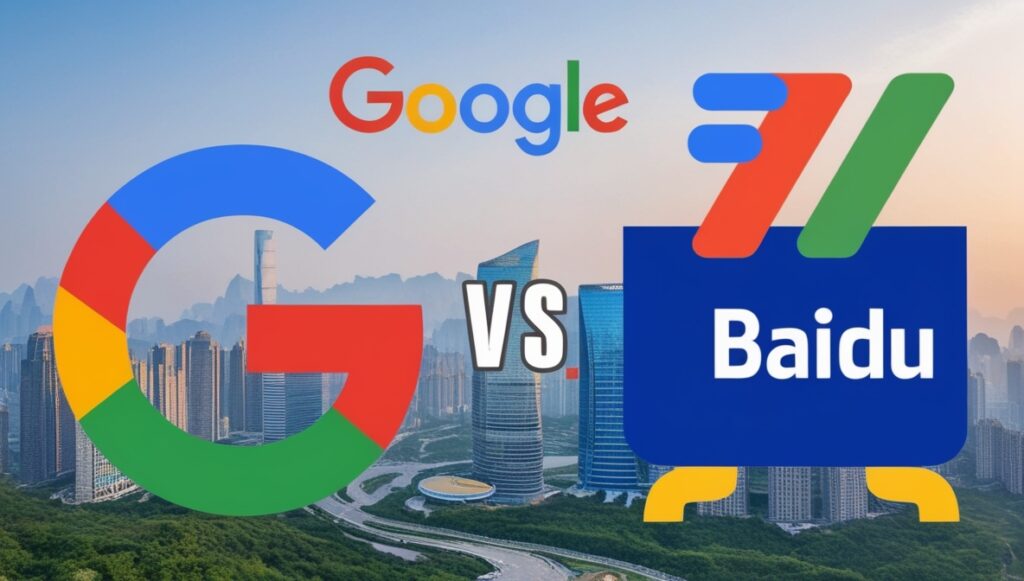
In the global digital landscape, Google reigns supreme, holding over 90% of the market share in most regions. However, when it comes to China, Baidu dominates, controlling more than 70% of the Chinese search engine market. For businesses aiming to tap into the Chinese market, understanding the differences between Baidu and Google is crucial, especially when it comes to SEO strategies.
1. Market Dominance and Localization

Google is the go-to search engine for users in most parts of the world, but it has little to no presence in China due to government restrictions. Baidu fills this gap, catering exclusively to Chinese users with an interface and algorithms designed for the Chinese language and user behavior. Thus, to rank well on Baidu, it’s essential to focus on Chinese-language content. Unlike Google, which processes multiple languages seamlessly, Baidu prioritizes simplified Chinese content and often struggles with non-Chinese websites.
This highlights the importance of localization for Baidu. Companies need to optimize their content, not just for the Chinese language, but also for local nuances, preferences, and search habits. For example, Baidu still values meta keywords, a practice largely abandoned by Google, and focuses on exact match keywords.
2. User Experience and Mobile-First Design
Both Baidu and Google emphasize the importance of user experience (UX). On both platforms, page speed, intuitive design, and mobile-first responsiveness are critical ranking factors. However, Baidu’s users are overwhelmingly mobile, meaning that a strong mobile strategy is even more vital. Baidu’s algorithms favor websites that load quickly and provide seamless navigation on mobile devices.
Google, in contrast, has a more sophisticated UX evaluation system, leveraging technologies like Core Web Vitals, which assess factors like loading speed, interactivity, and visual stability. While Baidu emphasizes UX, its metrics are simpler compared to Google’s advanced user experience standards.
3. Machine Learning and AI
Both Baidu and Google have invested heavily in machine learning and artificial intelligence to enhance search engine capabilities. Baidu’s AI tools are primarily focused on understanding Chinese user intent and improving voice and multimedia search functionality. Voice search is growing rapidly in China due to the increasing usage of smart devices and voice assistants.
Google, on the other hand, has integrated AI more deeply into its search algorithms, especially through RankBrain and BERT, which are designed to better understand user intent and deliver more relevant search results.
4. Content Censorship and Compliance
A significant difference between Baidu and Google is the role of content censorship. Baidu operates under Chinese government regulations, meaning that content censorship is an inherent part of the SEO process. Websites and content must comply with strict guidelines, with Baidu frequently filtering or restricting content based on national laws and policies. In contrast, Google focuses more on quality content without direct censorship, though it still penalizes black hat SEO practices and misleading content.
This means businesses need to be mindful of the content they publish on Baidu, ensuring it adheres to China’s legal and cultural expectations. Host websites within mainland China, preferably with .cn domains, and obtain an ICP (Internet Content Provider) license to ensure compliance and better rankings.
5. Backlinks and Domain Preferences
In both search engines, backlinks play a key role in SEO, but the strategies differ. Baidu values backlinks from local Chinese websites, with a strong emphasis on websites hosted in mainland China. In contrast, Google’s algorithms favor backlinks from high-authority websites regardless of location, emphasizing the quality and relevance of those links.
Moreover, domain age is particularly important in Baidu’s algorithm. Baidu gives preference to older, well-established domains. Google’s system also considers domain history, but it’s not as heavily weighted as it is in Baidu’s ranking system.
6. Rich Snippets and Structured Data
Google is known for its extensive use of structured data and rich snippets, which enhance search result displays with additional information such as images, ratings, and prices. Baidu also uses rich snippets, but the feature is less widespread and generally limited to established sites. Unlike Google, Baidu doesn’t support schema markup, which limits the extent to which businesses can optimize for enhanced search result appearances.
7. SEO Tools and Analytics
While Google offers an array of powerful tools like Google Search Console and Google Analytics, Baidu’s Webmaster Tools are more limited in functionality. They do provide insights for improving site performance on Baidu, but the platform lacks some of the real-time data and advanced features found in Google’s tools.
Conclusion: Tailoring Your SEO Strategy

To succeed with SEO on both Baidu and Google, businesses must recognize the platforms’ unique challenges and opportunities. For Google, a global SEO strategy focusing on high-quality content, user experience, and authority backlinks is essential. On Baidu, the strategy should focus on localization, compliance with Chinese regulations, and mobile-first optimization.
By understanding these differences and tailoring your SEO efforts accordingly, your business can maximize its visibility and performance across both search engines, whether you’re targeting Chinese markets via Baidu or global audiences through Google. If you’re looking for expert help in navigating these challenges, Dust Digital Marketing Ltd. can provide you with the SEO expertise you need to dominate both platforms.
For more tailored SEO solutions, contact us today at Dust Digital Marketing.

